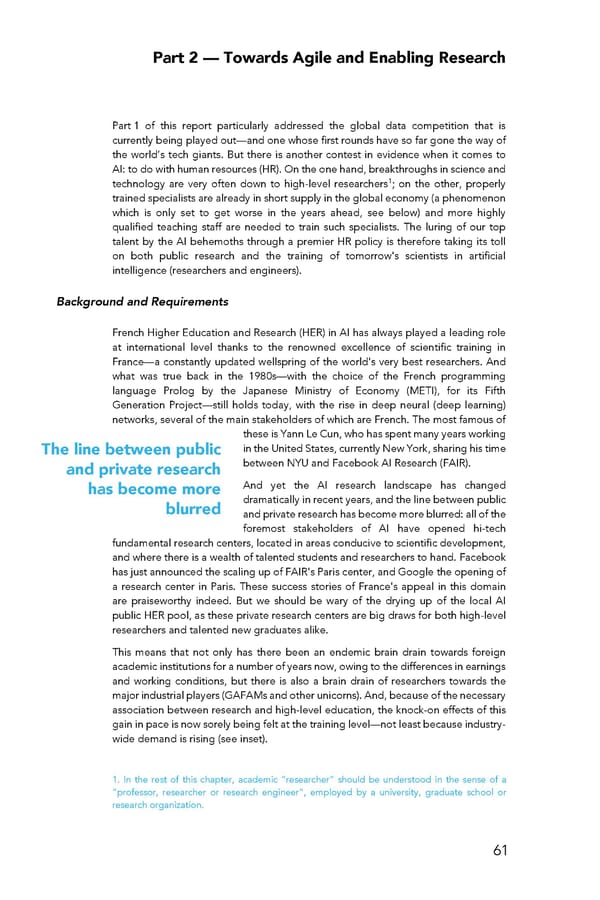Part 2 — Towards Agile and Enabling Research Part 1 of this report particularly addressed the global data competition that is currently being played out—and one whose first rounds have so far gone the way of the world’s tech giants. But there is another contest in evidence when it comes to AI: to do with human resources (HR). On the one hand, breakthroughs in science and technology are very often down to high-level researchers1; on the other, properly trained specialists are already in short supply in the global economy (a phenomenon which is only set to get worse in the years ahead, see below) and more highly qualified teaching staff are needed to train such specialists. The luring of our top talent by the AI behemoths through a premier HR policy is therefore taking its toll on both public research and the training of tomorrow's scientists in artificial intelligence (researchers and engineers). Background and Requirements French Higher Education and Research (HER) in AI has always played a leading role at international level thanks to the renowned excellence of scientific training in France—a constantly updated wellspring of the world's very best researchers. And what was true back in the 1980s—with the choice of the French programming language Prolog by the Japanese Ministry of Economy (METI), for its Fifth Generation Project—still holds today, with the rise in deep neural (deep learning) networks, several of the main stakeholders of which are French. The most famous of these is Yann Le Cun, who has spent many years working The line between public in the United States, currently New York, sharing his time and private research between NYU and Facebook AI Research (FAIR). has become more And yet the AI research landscape has changed blurred dramatically in recent years, and the line between public and private research has become more blurred: all of the foremost stakeholders of AI have opened hi-tech fundamental research centers, located in areas conducive to scientific development, and where there is a wealth of talented students and researchers to hand. Facebook has just announced the scaling up of FAIR's Paris center, and Google the opening of a research center in Paris. These success stories of France's appeal in this domain are praiseworthy indeed. But we should be wary of the drying up of the local AI public HER pool, as these private research centers are big draws for both high-level researchers and talented new graduates alike. This means that not only has there been an endemic brain drain towards foreign academic institutions for a number of years now, owing to the differences in earnings and working conditions, but there is also a brain drain of researchers towards the major industrial players (GAFAMs and other unicorns). And, because of the necessary association between research and high-level education, the knock-on effects of this gain in pace is now sorely being felt at the training level—not least because industry- wide demand is rising (see inset). 1. In the rest of this chapter, academic "researcher" should be understood in the sense of a "professor, researcher or research engineer", employed by a university, graduate school or research organization. 61
 For a Meaningful AI - Report Page 61 Page 63
For a Meaningful AI - Report Page 61 Page 63